
What is GDPR?
The General Data Protection Regulation (GDPR) is a regulation that requires businesses to protect the personal data and privacy of EU citizens for transactions that occur within EU member states.
GDPR also regulates the export of personal data outside the EU.
The GDPR was put into effect in 2018, with the goal of harmonizing data privacy laws across Europe, protecting and empowering all EU citizens’ data privacy, and reshaping the way organizations approach data privacy.
Why Should Small Businesses Care About GDPR Compliance?
There are several reasons why small businesses should focus on GDPR compliance even if they do not directly operate in the EU market:
-
Fines for non-compliance can be up to 4% of annual global turnover or €20 million, whichever is higher. This can cripple a small business.
-
It helps build trust and loyalty with customers by showing a commitment to ethical data practices.
-
Having strong data protection policies in place makes your business more resilient against cyber attacks.
-
If any EU customers interact with your business, their data must be protected under GDPR, no matter where you are located.
-
Future-proofing – more countries are starting to model data privacy laws after GDPR. Getting compliant now prepares your business for the future.
GDPR Compliance Checklist for Small Businesses
Here are the key steps small businesses should take to comply with GDPR:
Audit Your Data Collection, Storage and Usage
-
Document what personal data you collect, where it’s stored, how it’s used, who has access, and how long you retain it.
-
Review your data retention policy to ensure you only keep data for as long as necessary.
Update Privacy Policies and Notices
-
Create a privacy policy that outlines what data you collect and how it’s used in simple language your customers can understand.
-
Obtain explicit consent from customers to collect and use their data. Consent cannot be opt-out, it must be opt-in.
-
Provide customers a way to review, edit or delete the data you store on them.
Implement Data Protection By Design
-
Anonymize customer data wherever possible.
-
Use encryption and access controls to protect data at rest and in transit.
-
Ensure you have procedures in place to detect, report and investigate a data breach.
Update Vendor and Partner Agreements
-
Review agreements with vendors and partners that handle customer data and ensure GDPR compliance is maintained.
-
Put data processing agreements in place as needed.
Train Employees on GDPR Principles
-
Educate employees, especially those that handle customer data, on GDPR and your data policies.
-
Make data protection part of your company culture.
Appoint a Data Protection Officer (If Required)
-
Under GDPR, businesses that process a lot of sensitive data may need to formally appoint a Data Protection Officer (DPO).
-
A DPO is responsible for overseeing data protection strategy and GDPR compliance.
-
Smaller businesses likely don’t need a dedicated DPO, but should assign someone to be accountable for compliance.
Regularly Review and Update Your Compliance Strategy
-
GDPR compliance is an ongoing process that requires regular audits and policy reviews as your business changes.
-
Continuously look for ways to strengthen data protection for customers.
-
Keep up to date on any changes to local data protection laws.
By investing time in GDPR compliance now, your small business can demonstrate to customers your commitment to ethical data handling while avoiding steep fines and mitigating cyber attack risks. Review the checklist steps above to get started on your GDPR compliance journey today.












